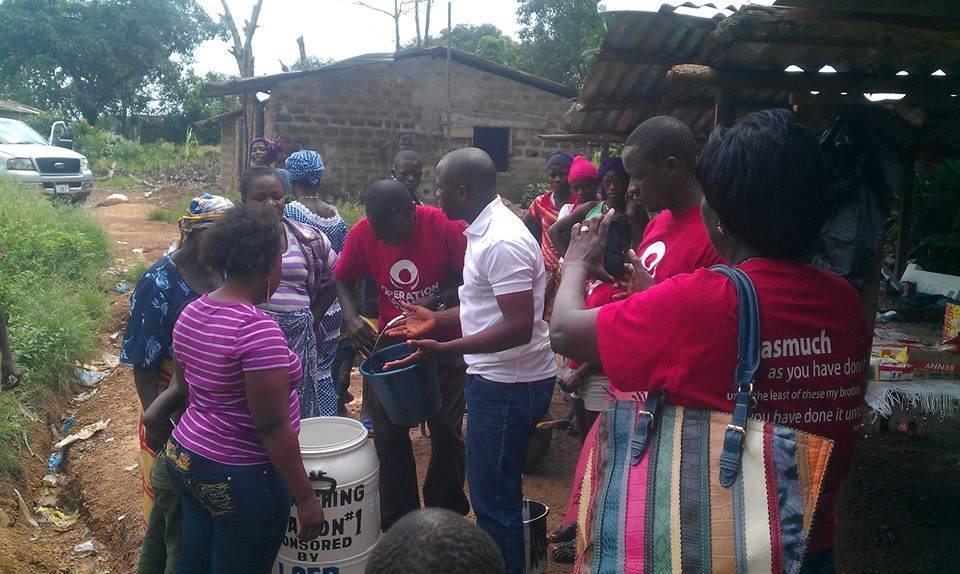
Section Branding
Header Content
Bringing Fresh Water To Liberia: How One Group Is Helping To Combat The Ebola Virus
Primary Content

The Centers for Disease Control and Prevention says just under a million and a half people could get the Ebola virus by early next year.
That's if the response to the disease isn't ramped up.
One non–profit group with roots in Atlanta is doing what it can to combat the outbreak.
The Liberia Orphan Education Project is giving out fresh water to remote parts of Liberia, and working with residents there to teach communities about disease prevention.
Emmalee Hackshaw co–founded the group.
She sat down with GPB All Things Considered host Rickey Bevington to talk about the impact of the group’s Handwashing Hygiene Project.
Rickey Bevington (host, GPB’s All Things Considered) :Your group has been working in Liberia for just about a decade. And yet you have responded to the Ebola crisis in a very specific way. How is your organization responding to Ebola to help?
Emalee Hackshaw (co-founder, The Liberia Orphan Education Project): Well, we are an education based organization. And our focus is on education and training teachers. Liberia is in a state of emergency and schools are closed. They didn’t open this year as they would have in August. And our teachers, as everyone, became increasingly alarmed at the Ebola crisis. And so, the Liberia Orphan Education project talked with our partners in Liberia to see what would be the best thing that we could do to help them during this time. They’re not working in their classrooms and we came up with the Handwashing Hygiene Project with our partners. So {we} are raising funds here in the U.S and we are supplying the funds to our LOEP emergency response team in Liberia and they are the really ones doing the work. This is a way for us to empower our teachers which is really what we always want to do. So we are providing them funds to purchase and distribute the handwashing hygiene stations. The emergency response team came up with a whole plan of what the distribution was going to look like and how it was going to work. And put together a lesson plan on basic disease prevention and hygiene that they are sharing.
Rickey Bevington: So, your team in Liberia is distributing these handwashing stations. Describe what that contraption looks like.
Emalee Hackshaw: {Each} station is a bucket. An eight-gallon bucket or a 20-gallon bucket depending on the availability, with a spigot. And chlorine to go with it. The team distributes the bucket, they set it up. They teach the recipient, whether it’s a market community or a house compound how to use the bucket. How to refill it with chlorinated water and the importance of the sanitation piece of it.
Rickey Bevington:And that education piece is so important. It’s not just having the technology to wash your hands. It’s teaching people in Liberia the value and the need for washing your hands. How is that going?
Emalee Hackshaw:That’s right. Our team is doing an amazing job. They are teachers by trade and by nature and so this is just a wonderful way for them to feel empowered. And useful during this time. They’re not teaching in their classrooms. But they’re able to teach in the community, share this information. And get it out in the community. They also came up with a plan for monitoring the stations. So one month after the station is placed in a community, the team is going back to monitor that it’s still in use and they are filling it correctly and everything is going well.
Rickey Bevington: It seems like there is a lot of education needed about how disease is shared from one person to another. So this is a piece of that. But are you hearing from your team in Liberia about just educating average Africans about how disease is spread and how to protect themselves?
Emalee Hackshaw: Well, access to clean and sanitized water in rural Liberia is very very limited. And so providing the sanitation mechanism is one piece. But the education piece is so important. And our emergency response team.. these teachers. Their reports are so excited and they are feeling very empowered about being able to do something during this time, instead of just sitting at home in a panic. So, the education piece is really important and it’s also really important that these are Liberian teachers that are educating their fellow Liberians. And these teachers are well revered in their communities They are respected and they are trusted. And so to have these individuals providing this information is what is really impactful.
SLIDESHOW: The Handwashing Hygiene Project
Tags: heath, Ebola, the handwashing hygiene project, Rickey Bevington, emmalee hackshaw
